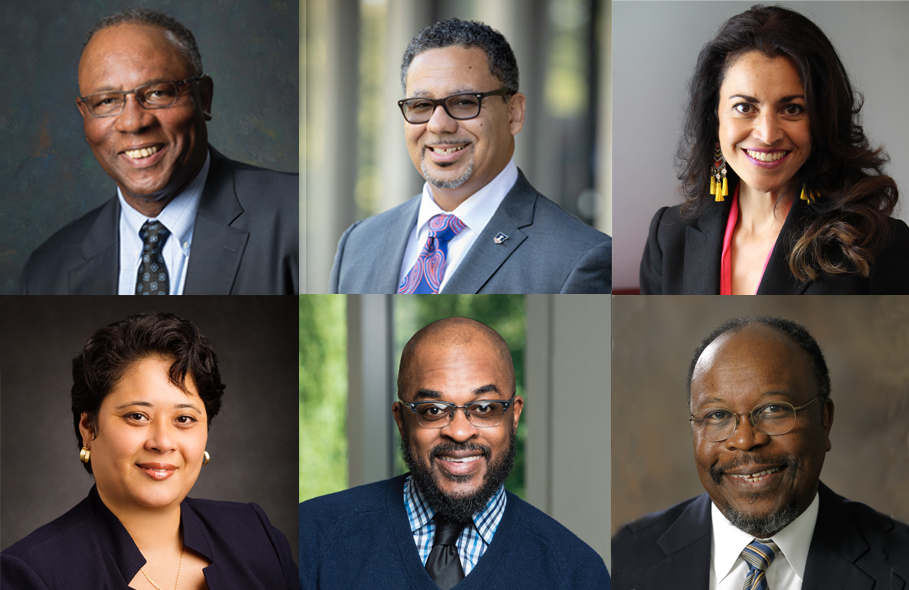Addressing Anti-Black Racism and the Rise of Global Protests: Is it Different This Time?
by Ashley Lawrence / Jun 23, 2020

Nationally-recognized thought leaders in social justice, equality, and the study of systemic racism shared their perspectives in a recent College of Education Virtual Town Hall Meeting.
In the wake of George Floyd’s death and protests and demonstrations around the globe, graduate students within the College of Education voiced a desire to acknowledge the unrest with a community-wide conversation. Students alerted leadership to concerns about mental, emotional, and physical health—amidst a pandemic already disproportionately impacting people of color—and a need for moving the dialogue forward in meaningful, actionable, immediate ways.
Where do we go from here? How do we move beyond the statements provided in this moment to the structural changes needed? How do we leverage the heightened awareness, energy, and fervor around racially-motivated inequity and injustice for lasting change?
“Many Education faculty and students have been committed to research—for a very long time—in areas of social justice, equality, and the examination of systemic racism inside and outside of education,” said James D. Anderson, College of Education Dean. “This is a great time to reflect on the work that we do and recommit ourselves to doing the kind of work to answer these important questions.”
Organized and moderated by Yoon Pak, Department Head of Education Policy, Organization and Leadership (EPOL), the virtual Town Hall Meeting rapidly came together and was held via Zoom the afternoon of June 18, 2020. The meeting opened with a talk and challenge from Dean Anderson.
“Whether within the university or state agencies, we need to be engaged in research activities that inform about and provide interventions for systemic racism,” Anderson said. “We will know that society is seriously interested in ending systemic and institutionalized racism when they begin to support the kinds of research that will bring about change.”
From there, faculty members participated in a roundtable discussion related to topics within systemic racism—detailed, below. Time for general questions from Education community attendees followed the faculty roundtable discussion.
You can find the entire Town Hall Meeting recording on the College’s YouTube channel. Links to additional resources, referenced during the meeting, are listed below.
James D. Anderson, Dean and Gutgsell Professor
“Addressing Anti-Black Racism and the Rise of Global Protests: Is it Different This Time?”
Anderson’s scholarship focuses broadly on the history of U.S. education, with specializations in the history of African American education in the South, the history of higher education desegregation, the history of public school desegregation, and the history of African American school achievement in the 20th century.
Christopher Span, Associate Dean for Graduate Programs and Professor of EPOL
“Historical Contexts and Lessons About Racism in the U.S. that Everyone Should Know”
Span’s research interests primarily pertain to the educational history of 19th and 20th century African Americans and his scholarship is widely recognized in the varying fields in education.
Rochelle Gutierrez, Professor of Curriculum & Instruction
“How do we Transform Teacher Education? As Early as Pre-K, How Do We Instill Dispositions of Equality and Inclusivity?”
Gutierrez' scholarship focuses on issues of identity and power in mathematics education, paying particular attention to how race, class, and language affect teaching and learning. Through in-depth analyses of effective teaching/learning communities and longitudinal studies of developing and practicing teachers, her work challenges deficit views of students who are Latinx, Black, and Indigenous.
Adrienne Dixson, Professor of EPOL
“The Role of Educational Researchers in Bringing Systemic Racism to Light, and What Whites Can Do, Beyond Statements, to Move Toward Dismantling It”
Dixson’s primary research interest focuses on how issues of race, class, and gender intersect and impact educational equity in urban schooling contexts. She locates her research within two theoretical frameworks: Critical Race Theory and Black Feminist Theories.
Rodney Hopson, Professor of Educational Psychology
“Global Awareness of Anti-Black Violence and Racism and How it’s Become a Protest Movement Worldwide”
Hopson’s research interests lie in social politics and policies, foundations of education, sociolinguistics, ethnography, and evaluation. Relative to his research interests, Hopson raises questions that address the differential impact of education and schooling on marginalized and underrepresented groups in diverse global nation states and seek solutions to social and educational conditions in the form of alternative paradigms, epistemologies, and methods for the way the oppressed succeed and thrive despite circumstances and opportunities that suggest otherwise.
William Trent, Professor of EPOL
“Impacts of Systemic Racism on Health and Within Socio-political Structures”
Trent’s lifelong research has focused on the Sociology of Education: educational inequality; race and ethnicity; and complex organization/social change/education policy.
“We have to work on doing the scholarship that produces the insights and the understanding that help us not harm ourselves by internalizing any of this poison, as people of color. And work on preventing the expansion of and continued embedding of negative master narratives in our schools, in our literature, and in our workplaces,” said Trent.
Additional Resources:
Dean’s Distinguished Lecture Series
Race and Cultural Diversity in American Life and History on Coursera
Office of Community College Research and Leadership (OCCRL)
How to Talk to Kids About Race and Racism
How Racism Hurts Black Mental Health and How You Can Help
Psychology of Radical Healing Collective blog
David Williams TED Talk: How Racism Makes Us Sick